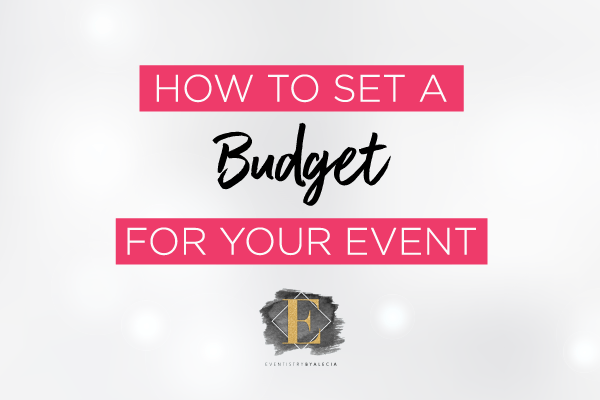So you want to host an event, but you may be wondering how to set a budget for your event. Planning an event is a wonderful process but certainly takes a lot of effort. It can be a pretty daunting task for newcomers. A big concern for many entrepreneurs is setting a budget for an event. Events can get quite expensive, so setting an event budget in the long run will set you up for success, and help you stay on track of how much you want to spend. Don’t forget to download my free event planning guide to really help you be successful at your next event!

Why not download my free event budget worksheet? This free event budget worksheet is perfect for coaches and entrepreneurs looking to budget their first event.
Will the amount set aside create an event with a real ‘wow factor’? What happens if you can’t include everything you want? How do you even plan a budget?
Planning your budget and staying within it is not as hard as you might thing providing you prep properly and stay the course of your plan. My favourite tip for planning an event budget is to start small and be realistic. Can you ask a friend or family member to help you, instead of hiring staff? Can you hire a student videographer for a little less than a full priced videographer? Perhaps you can offer a smaller AM snack, rather than a full fledged breakfast.
If you need guidance, here are some of my tips to help you set a budget, and my free downloadable budget spreadsheet for your event, whether you are hosting a small retreat or large coaching event.
Research, research, research
Did I mention research? Ha yes! This is probably an obvious step but if you don’t spend enough time checking things out you could easily overlook areas and end up not having enough to cover everything.
You should familiarise yourself with the cost of things such as caterers, venue hire, even accommodation if needed, this is especially important if you have no idea what things cost. The more you learn in the research phase will allow you to have a clear idea of what your budget should be. Start out by submitting RFPs and understanding how much it costs in the area you are looking to host your event. Different markets will have different price points. For instance, bigger cities will have a higher price point for event spaces and food, whereas you could probably cut that budget in half for smaller cities.
Set your budget amount
The overall budget amount needs to include everything. You should know what you can afford to spend as well as what you would like to spend before any planning begins. This will give you a clear idea of how you need to break down your budget to cover all costs.
You should also include a contingency budget which will be useful if any unexpected costs occur or should you find you really want to hire a vendor whose price was a little more than you planned for but know that it is worth the added expense.
After doing much of your research you will have a better idea of how your total budget should be broken down and allocated. This is where it is handy to have a spread sheet so that all of your requirements can be listed and the budget can be itemized.
Check the small print
There is nothing worse than thinking you have managed to get everything within budget and then realizing you have overlooked small details such as tax and tips. When you compile your quotes from vendors and go through them, be sure to calculate the prices so they are inclusive of everything, it will save you from small surprises when payment is due. Make sure you are also familiar with any permits your event will require. When I first started out as an event planner, I forgot to include a lot of the small print and fees, which did not reflect well on the event budget after the event was said and done.
Communication
Communication is important when working on any project and planning an event is no different. If you are working with a team it is important to keep everyone in the loop and if possible have just one person assigned to making decisions. This way, there will be no confusion or added costs of setting your budget, as the sole decision maker will be tracking every little expense on the project. Our team uses Asana for our event management clients, as it’s a great tool to get everything organized and on track for success. Read here on how to set up your Asana board for Event Planning.
Regular updates with your team (remote or in person) will be helpful to everyone involved in the planning and will help the process, as someone may have a really great contact or idea that you could incorporate.
Luxury vs Necessity
Of course you want your event to be one to remember and with careful planning it will be but when it comes to setting a budget for your event, it is a good idea to draw up a list of the necessities and the luxuries…the should’s and could’s.
This luxury vs necessity list will help you with your expenditures, as you will be able to secure all of the things you need before turning to the things you would like to have. This is a really simple way to eliminate unnecessary expenses if your budget won’t stretch.
Are you ready to set a budget for your event?
To sum it all up, be realistic if you don’t have a large budget. Do your research, use a budget spreadsheet (like the one below!) to track all your expenses. I also always leave room for “unaccounted” or “uh oh’s” because you never know if you will need a lil’ extra in case the caterer doesn’t show up, or something didn’t ship in time. Setting a budget is super important, so let’s get to those numbers by downloading this handy template – this is the one I use for my clients, so personalize it and have fun!
I also invite you to download a bunch of other fantastic budget planning freebies over at Freebie Finding Mom. Use these free printable budget worksheets to keep your family’s finances on track! They’re great for every day expenses!

This free event budget worksheet is perfect for coaches and entrepreneurs looking to budget their first event.





1 Comment
[…] Establish a budget within your limits. You don’t want to spend thousands over budget and then have to pay out of pocket. Why not check out and download my Event Planning Budget Template? […]
Your comment is awaiting moderation.
[…] compete with an event planner with no budget. Set your number and stick to it. Download my free event budget worksheet in order to have a chic, styled event while being a diva on a […]
Your comment is awaiting moderation.
You have written a very informative article with great quality content and well laid out points. I agree with you on many of your views and you’ve got me thinking.